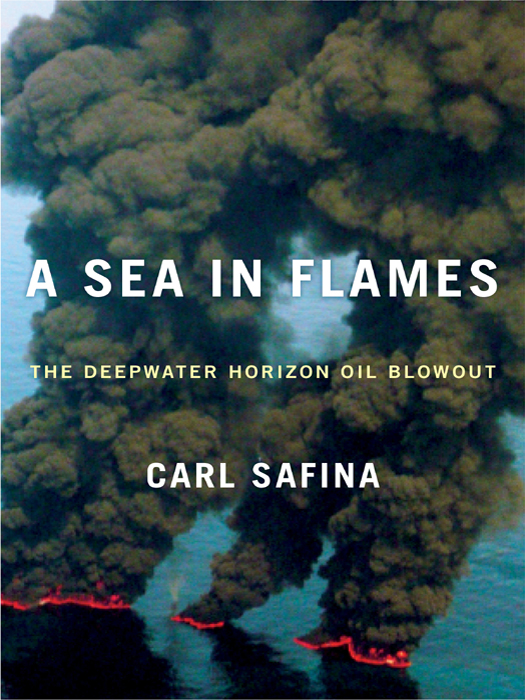
A Sea in Flames
The Deepwater Horizon Oil Blowout
کتاب های مرتبط
- اطلاعات
- نقد و بررسی
- دیدگاه کاربران
نقد و بررسی

February 28, 2011
MacArthur "Genius" Award–winning oceanographer and conservationist Safina offers an impassioned, on the ground chronicle of the 2010 Gulf oil blowout that surpassed Exxon-Valdez to rank as the worst in history. He breaks down the political and corporate causes and the environmental effects of the spill: the bedding together of government and Big Oil that produced the perfect storm of deregulation and drilling incentives; the intricate chain of misjudgments by BP, Transocean, and Halliburton; the mind-boggling amount of oil—4.9 billion barrels—that gushed into the Gulf of Mexico; the numbers of dolphins, birds, and sea turtles that perished; the rig workers, fishermen, bait shop owners, and restaurateurs who lost their lives or businesses to the spill. Safina's witticisms at times fall flat—he can only refer to Coast Guard Adm. Thad Allen as "the Thadmiral" or refigure BP's initials as "Bullying People," "Billowing Petroleum" or, worst yet, "Bull Poop" so many times before the joke exhausts itself. However, as Safina registers his responses in the wake of the spill, from outrage to cautious hope, his account achieves a broad, reasoned perspective that frames events against the more insidious damage that farm and industrial runoff, canal-digging, levee-building, and rising sea level have wrought on the Gulf and its wetlands.

February 1, 2011
Oceanographer and nature writer Safina (The View from Lazy Point, 2011, etc.) etches an emotional topography of the 2010 Gulf of Mexico oil blowout.
The author begins in an artful, participatory-journalist mode, endeavoring to get his facts straight while unafraid to voice his interpretation of unfolding events. (A fitting hand-in-glove with Safina's book is John Konrad's Fire on the Horizon (2011), which presents a veteran deckhand's view of the events and shares with it many conclusions.) Safina's writing is jumpy, staccato and portentous as he follows the drilling work on the Deepwater Horizon, an accident-in-waiting with outdated equipment, a multitiered corporate management willing to dangerously cut corners and an absence of emergency preparation. When Halliburton's cementing job unsurprisingly failed—"Halliburton officials knew weeks before the fatal explosion that its cement formulation had failed multiple tests—but they used the cement anyway"—at the expense of 11 lives, BP was more interested in controlling their public image than the wellhead. Appalled by the recklessness of the causes and the inanity of the response, the author is skeptical of BP's announcements and cynical as to their motives. Sharing responsibility with BP is an oil-industry–besotted Congress, eager to subsidize their benefactors while cutting back on big-government safety regulations; the Coast Guard, whose over-measured response felt "like a Kabuki dance"; and a legal process that put the criminal in charge of the crime scene (BP security was given control of public space). Safina calls certain environmental organizations on their shrill, not necessarily helpful responses, and President Obama for not seizing the opportunity to bring energy policy before the public's widened eye. The jury is out regarding environmental consequences: The Gulf appears to have absorbed the 206 million gallons of crude, but long-term effects of the dispersed oil will be tallied over years. Public perception of the devastation, fueled by a hyperventilating media, has wreaked havoc on tourism and fishing industries, which do not show evidence of poisonous degradation.
The blowout was awful, but look at the bigger picture, writes Safina in this illuminating, monitory study: "The real catastrophe is the oil we don't spill...the oil we burn, the coal we burn, the gas we burn...And as the reefs dissolve and the ocean's productivity declines, so will go the food security of hundreds of millions of people."
(COPYRIGHT (2011) KIRKUS REVIEWS/NIELSEN BUSINESS MEDIA, INC. ALL RIGHTS RESERVED.)

November 1, 2010
President and cofounder of the Blue Ocean Institute and a renowned conservationist, Safina blogged extensively about the BP oil spill. Here, he focuses on three working families to show how the spill has affected life in the Gulf. Likely one of the first books on the spill and certainly important; note, by the way, that Safina is a MacArthur "Genius Award" recipient.
Copyright 2010 Library Journal, LLC Used with permission.

March 1, 2011
Environmentalist Safina (The View from Lazy Point, 2010) brings his signature compassion, marine expertise, and gorgeous writing to his candidly expressive coverage of the Deepwater Horizon disaster a year after the explosion. In often caustic, in-the-moment commentary, he chronicles his investigative visits to the Gulf Coast as approximately 4.9 million barrels of oil gushed into the sea for 86 days, his conversations with distressed fishermen, and his anger over all the catastrophizing and the obfuscations of BP executives and governmental authorities. Safina is scathing in his accounts of BPs egregious irresponsibility and arrogance, particularly the gag order it issued to the desperate fishermen on its payroll. In confessing to his not-always-merited fury with the Coast Guard, Safina conveys the fear and frustration of those alarming months, while his inquiry into BPs aggressive use of dispersants, the potentially severe long-range impacts of the spill, and the 27,000 aging oil wells primed for blowouts on the Gulf seafloor point to a disaster-in-progress. So, too, Safina incisively observes, does the oil we burn daily, sending carbon dioxide into the warming atmosphere.(Reprinted with permission of Booklist, copyright 2011, American Library Association.)

























دیدگاه کاربران